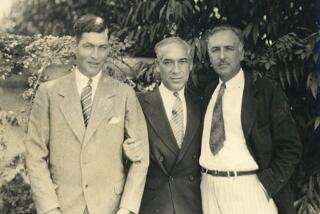Review: ‘Last of the First’ an academic but valuable look at Africa’s Hadza
The Hadza, people who inhabit the Lake Eyasi region of northern Tanzania, trace their lineage to the earliest known ancestors of mankind. The documentary “The Hadza: Last of the First” explores their way of life, which has been mostly untouched by time, until now.
The Hadza may have existed for more than 100,000 years, according to genetic testing, but their sustainable hunter-gatherer way of life has not wavered — even as their land has shrunk to about 200 square miles from about 1,000. Still, the expansion of neighboring tribes and agriculture is gradually depleting the natural resources on which the Hadza depend.
Filmmaker Bill Benenson’s National Geographic approach looks far from cinematic. Segments of amateurish computer-generated animation and narration feel awkwardly academic, as do those of a Harvard University anthropology professor and a University of Nevada anthropologist.
But the film manages to eschew the myth-making ethnography exemplified by Robert Flaherty’s 1922 “Nanook of the North.” Although the Hadza’s way of life seems primitive, the egalitarian society appears far more civilized than ours. The film proves most valuable when Hadza subjects candidly discuss their clashes with modernity. Children Neeje and Shinje describe their two-day walk home from boarding school to escape the corporal punishment they’ve never received at home.
“The Hadza: Last of the First.”
No MPAA rating.
Running time: 1 hour, 10 minutes.
Playing: Landmark’s Regent, Westwood.
More to Read
Only good movies
Get the Indie Focus newsletter, Mark Olsen's weekly guide to the world of cinema.
You may occasionally receive promotional content from the Los Angeles Times.






